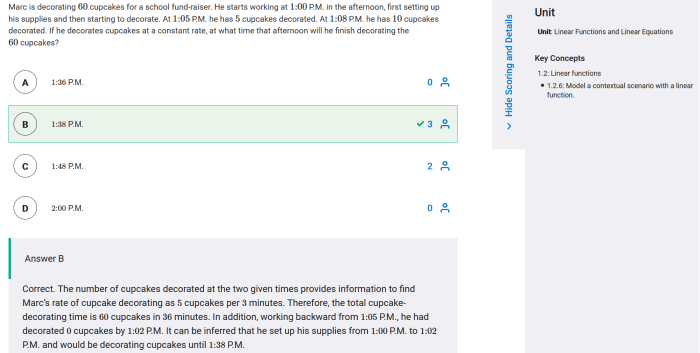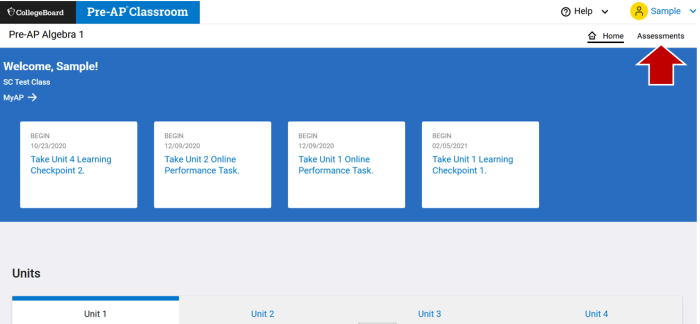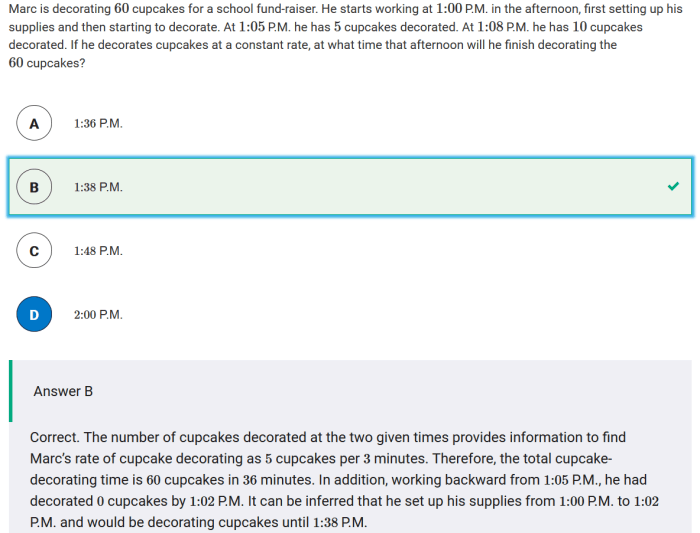Embark on an enlightening journey as we delve into Unit 4 Learning Checkpoint 1. This pivotal assessment offers a comprehensive evaluation of your grasp of key concepts and skills, propelling you towards academic excellence.
Prepare to unravel the intricacies of this checkpoint, exploring its significance, structure, and invaluable resources. With a clear understanding of what lies ahead, you will be empowered to conquer this challenge and emerge victorious.
Overview of Unit 4 Learning Checkpoint 1

Unit 4 Learning Checkpoint 1 is a crucial assessment designed to evaluate your understanding of key concepts and skills covered in the first half of Unit 4. It serves as a checkpoint to ensure that you have a solid foundation before moving on to more advanced topics.
Key Concepts and Skills
The checkpoint covers a range of important concepts and skills, including:
- Understanding the principles of probability
- Calculating probabilities using different methods
- Applying probability to real-world scenarios
- Solving problems involving conditional probability and independence
- Using probability distributions to model random variables
Key Concepts and Skills

Unit 4 Learning Checkpoint 1 introduces essential concepts and assesses students’ proficiency in specific skills related to statistical analysis and probability.
Key Concepts
The checkpoint covers fundamental concepts such as:
-
-*Descriptive statistics
Measures that summarize and describe data, including mean, median, mode, range, and standard deviation.
-*Probability distributions
Mathematical models that describe the likelihood of different outcomes in a random experiment.
-*Normal distribution
A bell-shaped distribution that represents the distribution of many natural phenomena.
-*Sampling distributions
Unit 4 Learning Checkpoint 1 provides a solid foundation for understanding key concepts. For an inspiring perspective, explore the aha moment by Julia Alvarez , where she shares her insights on embracing challenges and finding clarity. Reflecting on this insightful piece will further enhance your comprehension of Unit 4 Learning Checkpoint 1.
Distributions of sample statistics, such as the mean, that are used to make inferences about the population from which the sample was drawn.
Skills
Students are expected to demonstrate the following skills in the checkpoint:
- Calculating and interpreting descriptive statistics.
- Understanding and applying probability distributions.
- Using the normal distribution to make inferences about population parameters.
- Constructing and interpreting confidence intervals.
- Conducting hypothesis tests to compare population means.
Assessment Format

Unit 4 Learning Checkpoint 1 will assess your understanding of the key concepts and skills covered in the unit thus far. The assessment will be in a multiple-choice format, consisting of 20 questions.
Question Types
The questions will cover a range of topics, including:
- Key concepts and theories
- Application of concepts to real-world situations
- Analysis and interpretation of data
- Problem-solving
Preparation
To prepare for the assessment, it is important to:
- Review the unit materials thoroughly.
- Complete all assigned readings and activities.
- Practice answering multiple-choice questions on the key concepts.
- Seek clarification from your instructor or classmates if needed.
Practice Activities
To reinforce your understanding of the key concepts and skills covered in this unit, you can engage in the following practice activities:
Interactive Exercises
Participate in online simulations, quizzes, and interactive exercises that provide immediate feedback on your progress. These activities allow you to test your understanding in a dynamic and engaging manner.
Problem-Solving Tasks
Attempt problem-solving tasks that require you to apply the concepts you have learned. This will help you develop critical thinking skills and deepen your understanding of the material.
Review Questions, Unit 4 learning checkpoint 1
Review the key concepts and skills by answering questions that test your comprehension. You can refer to your notes, textbook, or other resources to enhance your understanding.
Collaboration and Discussion
Engage in discussions with your classmates or participate in online forums. Sharing your thoughts and insights with others can help you solidify your understanding and gain new perspectives.
How these Activities Enhance Performance
By actively engaging in these practice activities, you can improve your performance on the checkpoint in several ways:
- Reinforce your understanding of key concepts and skills.
- Develop critical thinking and problem-solving abilities.
- Identify areas where you need further clarification.
- Build confidence in your preparation for the checkpoint.
Sample Questions or Tasks
The following sample questions and tasks are designed to provide students with an opportunity to practice the key concepts and skills that they will need to master for Unit 4 Learning Checkpoint 1.
Multiple Choice
- Which of the following is a characteristic of a good hypothesis?
- It is testable.
- It is based on evidence.
- It is falsifiable.
- All of the above
- Which of the following is NOT a step in the scientific method?
- Make observations.
- Form a hypothesis.
- Test the hypothesis.
- Draw conclusions.
- Publish results.
Answer:d. All of the above
Answer:e. Publish results
Short Answer
- Explain the difference between a hypothesis and a theory.
- Describe the role of controlled experiments in the scientific method.
Answer:A hypothesis is a tentative explanation for a phenomenon, while a theory is a well-supported explanation for a phenomenon that has been repeatedly tested and confirmed.
Answer:Controlled experiments allow scientists to test hypotheses by comparing the results of an experimental group to the results of a control group. The control group is identical to the experimental group except for the one variable that is being tested.
Essay
- Discuss the importance of replication in scientific research.
Answer:Replication is important in scientific research because it allows scientists to confirm the results of a study and to rule out the possibility that the results were due to chance or error.
Additional Tips for Success: Unit 4 Learning Checkpoint 1

To excel in Unit 4 Learning Checkpoint 1, consider the following strategies:
Time Management
Plan your study time wisely to cover all the essential concepts. Break down the material into manageable chunks and allocate specific time slots for each.
Test-Taking Skills
Familiarize yourself with the assessment format and question types. Practice answering similar questions under timed conditions to enhance your speed and accuracy.
Review and Practice
Regularly review the covered material and complete practice activities to reinforce your understanding. Identify areas where you need improvement and focus on those during your studies.
Confidence and Motivation
Believe in your abilities and approach the checkpoint with a positive attitude. Remember that you have prepared diligently, and your hard work will pay off. Stay motivated by setting realistic goals and celebrating your progress along the way.
Commonly Asked Questions
What is the purpose of Unit 4 Learning Checkpoint 1?
Unit 4 Learning Checkpoint 1 serves as a crucial assessment tool, evaluating your understanding of key concepts and skills covered in the unit, ensuring your readiness for future academic endeavors.
What types of questions can I expect on the checkpoint?
The checkpoint may encompass a variety of question formats, including multiple-choice, short answer, and essay questions. Each question is meticulously designed to assess your comprehension of specific concepts and your ability to apply your knowledge.
Where can I find study resources for the checkpoint?
An array of study resources is available to assist you in your preparation for the checkpoint. These resources include online materials, textbooks, and practice exercises. Utilize these resources effectively to reinforce your understanding and enhance your performance.

